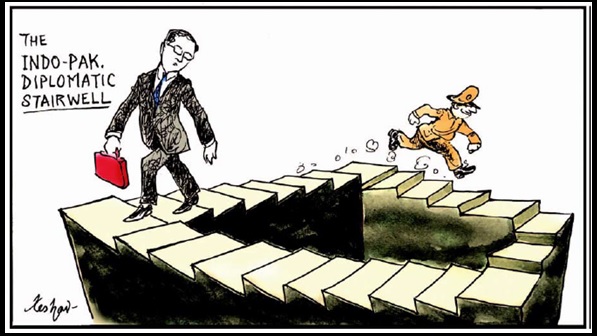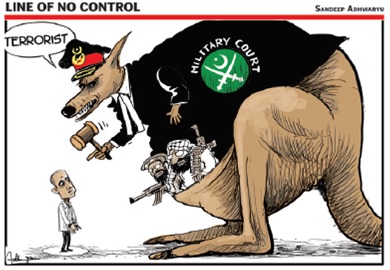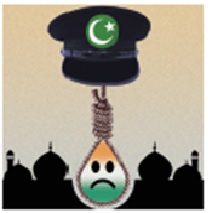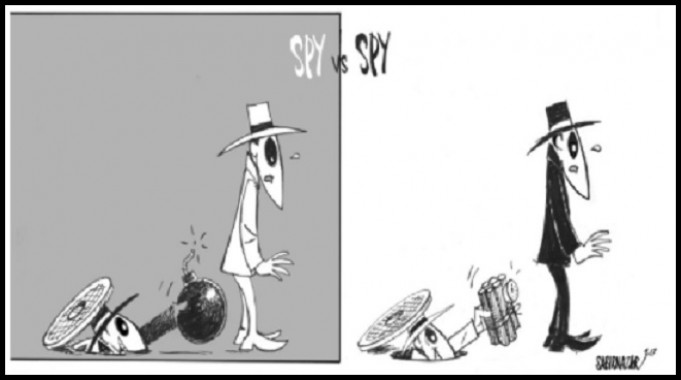The Indian and Pakistan media on the Jadhav ‘’spy’’ case
Express Tribune, April 14, Editorial page
Kulbhushan Jadhav, an alleged Indian spy, has been convicted and condemned to death in Pakistan. The sudden announcement took everyone by surprise. Pakistan claimed that Jadhav was arrested in Balochistan over charges of terrorism and spying for India's external intelligence agency, the Research and Analysis Wing (R&AW). India accepted that Jadhav was a retired Indian navy officer, but denied his links with R&AW and raised objections against the conviction.
This article analyses the coverage of Jadhav’s conviction between April 11 and April 17, 2017 in three Indian newspapers - The Times of India (TOI), The Hindu and The Indian Express (Indian Express) – and two Pakistani newspapers - Dawn and The Express Tribune (Express Tribune).
Key Findings
1. Pakistani newspapers did not publish any investigative report on this issue and uncritically accepted the army’s story.
2. Even before the trial details were known, Pakistani newspapers concluded that Jadhav was guilty.
3. Pakistani newspapers highlighted Pakistan’s nuclear capacity while discussing the case.
4. In comparison with Express Tribune, Dawn gave more space to Indian objections. However, Dawn also selectively quoted from the Indian media to support Pakistan’s claim.
5. There are differences between the news items and editorials published in Dawn. For example, concerns about the trial process that were reported in news items were overlooked in the editorials.
6. Dawn adopted different approaches to Uzair Baloch, (a gangster from Karachi who was picked up from “outside Karachi” by Pakistan’s paramilitary force in 2016), and Jadhav, both involved in similar cases. In Jadhav’s case, Dawn did not question the trial in a military court. However, in Baloch’s case, it criticised the decision to transfer it from a civil court to a military court.
7. The Indian news media mostly defended the Indian government’s claim that Jadhav was not a spy, highlighted the factual inconsistencies in Pakistan's claims, and criticised the procedural fairness of the trial. On the other hand, the Pakistani media focused on Jadhav’s identity and defended its government’s claims regarding the fairness of the judicial process.
8. Indian newspapers invoked Article 36 of the Vienna Protocol on Consular Relations, 1963 and criticised Pakistan for denying several requests for consular access to Jadhav. Pakistan’s newspapers supported their government’s stand by invoking a bilateral Agreement on Consular Access, 2008.
9. The Indian newspapers suggested that the sudden announcement of the conviction was made after the disappearance of a Pakistan army officer. Pakistani newspapers suggested that the disappearance of the Pakistani officer was linked to the Jadhav case as India might try to use him as a bargaining chip.
10. The media on both sides of the border predictably, but also unfortunately, stood by the “national interest” as defined by their respective governments and did not critically examine Jadhav’s case.
1. India’s reaction
The Indian government’s demarche called the conviction a “premeditated murder.” Express Tribune reported that “While majority in Pakistan endorsed the death sentence, the reaction from India was swift and angry” (April 11). Dawn reported that “Several Indian groups that usually campaign for improving relations with Pakistan have condemned the death sentence” (April 15). Indian newspapers did not report responses within Pakistan to Jadhav’s conviction.
2. Pakistan’s civilian-military divide
The day after the conviction, Indian Express’s front page story by Praveen Swami suggested that “the civilian government of Prime Minister Nawaz Sharif was not consulted prior to initiating the eleventh-hour military trial, initiated with the approval of Pakistan Army chief Qamar Javed Bajwa” (April 11).
An editorial of Indian Express also noted the civilian-military divide (April 12). TOI quoted a former German diplomat Gunter Mulack as saying that the Pakistan army was using Jadhav’s case “to undermine Pakistan PM Nawaz Sharif’s attempt to probe the involvement of Pakistan nationals in the Pathankot attack” (April 12). TOI again highlighted the civilian-military divide on April 15.
The Hindu’s editorial pointed out that the trial, sentencing and confirmation were carried out so secretly that the news took many in Pakistan as well by surprise (April 12). K.C Singh, in his opinion piece, suggested that Pakistan army was approaching “some re-balancing between the civilian and military authorities as Prime Minister Sharif awaits court judgement on the Panama Papers charges” (The Hindu, April 17).
While the Indian newspapers highlighted the civil-military divide in Pakistan, Dawn merely noted the silence of the government in Islamabad after the decision was released to the media (April 11). Express Tribune did not comment on this issue.
3. Consular access to Jadhav
TOI noted that India was denied access to Jadhav despite 13 requests in 13 months and wasn’t informed of the trial (April 11). Indian Express also reported the dates on which consular access was sought (April 11). Express Tribune and Dawn reported the Indian claim that it was not even informed that Jadhav was being brought to trial (April 11).
Indian newspapers criticised Pakistan for denying consular access under Article 36 of the Vienna Protocol on Consular Relations, 1963. Pakistan newspapers defended the Pakistan’s response to India’s request for consular access. Dawn recalled that the bilateral Agreement on Consular Access, 2008 does not cover those arrested for spying (April 11). Later Express Tribune and Dawn both reported the response of the Pakistan foreign office spokesperson. He said “under the agreement signed in 2008, the two countries had the discretion to accept such a demand in cases where issues of national security were involved” (Express Tribune, April 14).
Express Tribune also questioned India in its editorial for making consular requests and argued “Why else would 13 requests for consular access be made by the Indian diplomatic mission here if there was no connection between Jadhav and his handlers.” (April 15). While both noted Indian objections based on the Vienna Protocol, neither cared to explain why the 2008 agreement overrides the Vienna Protocol. Likewise the Indian newspapers did not explain their preference for the Vienna Protocol.
4. Jadhav’s “trial”
The Hindu’s editorial pointed out that the trial, sentencing and conviction were carried out so secretly that the news took many in Pakistan as well by surprise (April 12). TOI called Pakistan military court a secret court and Indian Express reported that “New Delhi was also not intimated until Sunday evening” (April 11).
In fact, Dawn noted that the “ISPR announcement did not say when the trial commenced, how long it continued and when the verdict was handed down. It only mentioned that the sentencing have been ratified by the Chief of the army staff Gen Qamar Jawed Bajwa on Monday” (April 11). This means that though nothing was known about the trial, Dawn was sure it was fair!
Later Dawn referred to the former Indian diplomat M.K. Bhadrakumar's opinion piece to support its claim that the trial process was consistent with international practices (April 12).But Dawn did not ask on what grounds a foreign national had been court-martialed – an issue that was raised by TCA Raghavan, former Indian High Commissioner to Islamabad (The Hindu, April 13).
Both Pakistani newspapers covered the press conference of Sartaj Aziz, Adviser to the Pakistani PM. Express Tribune claimed that Aziz debunked Indian claims (April 15). Dawn noted that Aziz did not take any questions. However, both overlooked the fact that just a few months ago Aziz told the Senate in December 2016 that Pakistan’s dossier against the retired Indian naval officer contained “mere statements” and there was no conclusive evidence.
5. Spy or not?
Dawn noted that “Everything from Jadhav’s official documentation to his alleged business ties in Iran suggest a spy’s cover story” (April 12), but it did not ask the basic question of why an Indian intelligence agent would carry an Indian passport.
Indian newspapers argued against the spy claim. Indian Express reported the opinion of Anand Arni, a former R&AW officer, who denied that Jadhav worked for the organization and added that “retired officers [were] never made assets and [R&AW] would never send anyone on a clandestine mission with an Indian passport” (April 11).
It also highlighted the statement of Iran’s envoy to Islamabad Mehdi Honardoost dismissing Pakistan charges that Jadhav was spy as “one hundred percent false” (April 11). Another investigative report by Praveen Swami pointed out the Jadhav’s failed efforts to approach R&AW and two illegal Indian passports used by him, but also reported that there was no evidence that proved him to be an Indian intelligence agent (April 12).
The Hindu highlighted Iran’s silence on Jadhav and suggested that its unhappiness over Delhi’s growing ties with Gulf countries might be one of the reasons behind the lack of investigative support from Iran in this case (April 17).
Indian newspapers recalled the statement of Gunter Mulack, former German envoy to Pakistan, saying that Jadhav had been caught by the Taliban in Iran and sold to Pakistani intelligence agencies (TOI, April 11 and April 12; Indian Express, April 11).
TOI’s editorial expressed doubts on the use of an Indian passport by a spy to incriminate his own country (April 12). TOI quoted Mulack, who had suggested that “the Pakistan army had responded through Jadhav to undermine Pakistan PM Nawaz Sharif’s attempt to probe the involvement of Pakistan nationals in the Pathankot attack” (April 12).
Express Tribune quoted a Pakistani foreign office spokesperson who argued that “the German ambassador who made this claim had now clarified that he gave the statement merely on ‘hearsay’’’ (April 14). The paper did not refer to the source of Mulack’s clarification. A story on the TOI website reported Mulack’s clarification in response to TOI’s question: “Well, that was an unconfirmed speculation from reliable sources which I cannot identify, nor confirm. Maybe it is not true.” This is not merely hearsay.
6. Spy vs Spy?
TOI reported the rumours in social media linking Jadhav’s conviction with the recent disappearance of a retired Pakistani army officer from Nepal (April 11). TOI also cited an Indian intelligence source saying that the abduction theory may have been concocted (April 12).
The Hindu’s editorial observed that “The timing of the announcement of the death sentence is also being seen in a spy versus spy context” (April 12). It also reported the opinion of an Indian official as a news item “Timing is important. They think that their missing officer is in Indian custody. By announcing the death sentence to Jadhav they have pre-empted the Indian move, and now if India were to make any move on that front it could be projected as retaliation” (April 12).
For the reasons behind the sudden action taken by Pakistan, an Indian Express editorial suggested that “Civil-military tensions and retaliatory action against the alleged abduction of a Pakistani officer are plausible enough propositions,” but went on to add that this argument lacked evidence (April 12). Indian Express also reported that the missing Pakistan army officer was in the team that trapped Jadhav (April 12).
Dawn’s editorial highlighted the possibility of a spy war by linking Jadhav’s conviction with the disappearance of the Pakistani officer and stressed that policymakers of both countries needed to address the issue (April 13). Express Tribune criticised India for the disappearance of the Pakistani officer, who had allegedly retired from military service several years before Jadhav’s arrest in its editorial. But that is precisely what the Indian government is saying, namely, that Jadhav had retired from the navy years before his abduction (April 15). Express Tribune published a cartoon assuming a spy exchange/war was going on between the two countries.
7. Editorials
TOI, The Hindu and Indian Express published one editorial each and Pakistan’s newspapers Dawn and Express Tribune published two editorials between April 11 and 17, 2017.
|
Issues discussed in editorials |
Hindu |
TOI |
Indian Express |
Dawn |
Express Tribune |
|
Transparency of trial process |
Yes |
Yes |
Yes |
|
|
|
Military court |
|
Yes |
Yes |
|
|
|
Jadhav is guilty |
|
|
|
Yes |
Yes |
|
Jadhav is not guilty |
Yes |
Yes |
|
|
|
|
Spy vs Spy |
Yes |
|
Yes |
Yes |
Yes |
|
Consular Access |
Yes |
Yes |
|
|
Yes |
|
Sartaj Aziz’s statement |
|
Yes |
Yes |
|
|
|
German envoy’s statement |
|
Yes |
|
|
|
|
Pakistan’s failure on terrorism |
|
Yes |
Yes |
|
|
|
India’s interference in Pakistan |
|
|
|
Yes |
Yes |
|
Nuclear capacity |
|
|
|
Yes |
Yes |
|
Failure of own government ‘s foreign policy |
Yes |
|
|
Yes |
|
Dawn’s editorial (April 12) criticised India’s intereference in Balochistan and its unauthorized entry in Pakistan, ‘a nuclear armed rival’. It is surprising that Dawn refers to Pakistan’s nuclear status in this context. It called India’s explanations unreliable, highlighted the possibility of spy wars, and suggested third party intervention or back channel communication for deescalating tensions.
It did not question the procedural fairness as it did in the case of Uzair Baloch. In April this year, he was transferred from police custody to the military to put him on trial for espionage. Dawn’s editorial published in 2016 questioned the arrest as “The authorities need to explain how Baloch ended up on Karachi’s outer rim when his last sighting was in the UAE.” Dawn has neither investigated, nor raised questions about the timing and place of Jadhav’s arrest. It may be recalled that India has claimed that Jadhav had business interest in Iran and was abducted from there.
Dawn’s latest editorial (April 14) demanded that the full extent of charges against Baloch be made public and suggested that “there must also be an explanation of Pakistan’s relations with Iran by the government as Iran is not India; Iran is a friendly country with which ties should be managed carefully”.
In an editorial published a few weeks after Jadhav’s arrest was made public, Dawn stated that “It is not only India that needs to answer serious questions here; Iran, which hosted the alleged spy, needs to investigate — and explain — the matter at its end” and suggested that “the matter must be handled professionally, lawfully and soberly — or else there’s a risk of inflaming anti-India sentiment and creating fresh space for extremist elements here” (April 27, 2016). But, a year later Dawn has completely forgotten its own exhortations
Indian Express published Praveen Swami’s report on Baloch based on the copy of a dossier on a Karachi-based criminal network disclosing no evidence against Jadhav. According to the Indian Express, in the dossier, Baloch was blamed for collaborating with Jadhav, and providing secret information to foreign agents but primarily for Iran and not India (April 14).
Express Tribune published its first editorial on April 15 after the Pakistan foreign office press meet in which it criticised India for making consular requests: “For a man who was initially disowned by his own countrymen, Jadhav has suddenly become somewhat of a cause celebre. Why else would 13 requests for consular access be made by the Indian diplomatic mission here if there was no connection between Jadhav and his handlers.”
On the other hand, it blamed India for keeping the Pakistani officer in its custody for leverage in the Jadhav case. “Instead of relying on legal and diplomatic measures, New Delhi appears to be working on some hidden fronts as usual.” Ironically, it both questioned India’s attempt to seek consular access and then condemnedit for relying on non-diplomatic means.
In another editorial (April 16) Express Tribune again criticised India for raising questions on the fairness of Jadhav’s trial and for postponing two key bilateral meetings between “the nuclear-armed-neighbours.” Like Dawn, Express Tribune chose to highlight Pakistan’s nuclear status. Both Dawn and Express Tribune failed to question the Pakistan government’s denial of consular access to Jadhav.

The Hindu, April 12, page 9, OPED page
The Hindu’s editorial (April 12) suggested that the conviction, based on an opaque trial, could lead to a rapid escalation in bilateral tensions. It noted that India’s current foreign policy was ineffective in bringing the desired results. It published a cartoon criticizing Pakistan’s approach to the bilateral relationship. Later on, Dawn published another editorial that pointed out the inability of PM Nawaz and his foreign policy to convince “either the Indian government or, seemingly, hawks in the security establishment there” (April 13).
Indian Express (April 12) questioned Pakistan’s claim to be a democracy governed by law. It contrasted Jadhav’s sentencing with Pakistan’s utter unwillingness to act against internationally proscribed terrorists such as Hafiz Saeed and Masood Azhar. It also reported frightening facts on Pakistan’s military court: “since 2015 Pakistan empowered military courts to try civilians for terrorism-related offences and at least 161 death sentences have been awarded in some cases to children in a closed door trials.” (Also, see Dawn, 6 March 2017 for statistics on death sentences).

Times Of India : April 12, page 14
These facts were also reported by TOI in a news item “that of the 274 convictions since February 2015 by these courts, 161 were sentenced to death. Of these, 144 convicts had “confessed” to their crimes. Not only were these trials kept under wraps, but the accused also did not have the right to appeal, which is a key component of a free and fair trial” (April 11). The Hindu also reported statistics on Pakistan’s military courts (April 11).
A TOI editorial considered the Pakistani military court’s death sentence for Jadhav a ‘’mockery of justice’’ (Image 4a) and the conviction as “nothing but a ploy to counter New Delhi’s diplomatic pressure on Islamabad for nurturing terrorism” (April 12). It also referred to the statement of Gunter Mulack. A TOI cartoon represented the military court as a kangaroo for keeping real terrorists safe in its pouch.

Times Of India : April 12, Editorial
Conclusion
The media in both countries predictably, but also unfortunately, stood by the “national interest” as defined by their respective governments and did not critically examine the case of Kulbhushan Jadhav. This has greater impact on the Pakistani people. Self-confession in a military court is the sole basis on which Pakistan’s media declared Jadhav guilty.
The Pakistani newspapers choose to overlook their own principled positions on issues such as rule of law and capital punishment when dealing with the case of an Indian. Such a selective approach could weaken the liberal constituency within Pakistan which these newspapers have nurtured over the years.
Ankita Pandey is an independent researcher based in Bengaluru.
